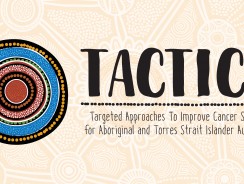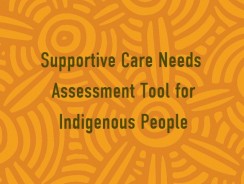Cancer is the second leading cause of death among Indigenous people and is responsible for more deaths each year than diabetes and kidney disease.
From 2008 to 2012, Indigenous Australians had a higher overall cancer incidence rate (484 versus 439 per 100,000, respectively) and a significantly higher age- standardised cancer mortality rate than non-Indigenous Australians (221 versus 171 per 100,000, respectively). They are more likely to have cancers with poorer prognoses, be diagnosed at a later stage of their cancer (due to a combination of late presentation and lower participation in screening programs), have a greater number of comorbidities, and are less likely to receive optimal treatment.
Some Indigenous cancer patients have fatalistic views of cancer, which may lead to lower treatment compliance and a lack of access to information and cancer treatment. They also experience high levels of unmet support needs, especially in psychological and practical need domains.
Although greater recognition of the importance of cancer as a health issue for Indigenous Australians has increased the research effort in this area, much remains to be done to reduce the increasing mortality gap between Indigenous and non-Indigenous Australians and improve the wellbeing of and cancer outcomes for Indigenous Australians.
To address these health disparities, Menzies has been at the forefront of research in this field. In 2013 we established two major Indigenous cancer focused initiatives: The DISCOVER-TT Centre of Research Excellence and a Strategic Research Priority program, STREP-CaCInDA.
We are continuing this strong foundation of work with the current NHMRC-funded (2019-2023) Centre of Research Targeted Approaches to Improve Cancer Services for Aboriginal and Torres Strait Islander Australians (TACTICS).
The TACTICS CRE is providing national and international leadership in research, knowledge translation, training and capacity building to improve the performance of cancer services for Indigenous Australians across the cancer continuum, from prevention and early detection to treatment and survivorship.
-

-

National Indigenous Bowel Screening Project
Find out about the online training module for health workers working with Aboriginal and Torres Strait Islander health people.
-

Targeted Approaches To Improve Cancer Services (TACTICS)
The Centre of Research Excellence (CRE) in Targeted Approaches To Improve Cancer Services (TACTICS) for Aboriginal and Torres Strait Islander People
-
SCNAT - IP
The SCNAT-IP is an evidence based supportive care needs assessment tool which accommodates the language, customs and culture-specific needs of Indigenous people with cancer.

.png&w=770&h=329)
